Things don’t get much bigger than Shopify. Although it’s not the biggest e-commerce platform around (that title goes to WooCommerce), it certainly holds its own when it comes to the features and value you get for the price. Therefore, this time I’ve created an extensive Shopify Basic Plan review.
These days it’s hard to stand out. There is an estimated 12-24 million eCommerce stores out there, and since Amazon takes over 37% of the market share, you’ve got to be doing something really different to stand out.
This is why you need Shopify.
I’m a big fan of Shopify. In my Shopify review, I have covered all the key features and pros and cons of this industry-leading eCommerce software. Here, I will zoom in on their Basic plan (from $29/month).
Not only does Shopify provide world-leading tools to sell your products, but you also get an incredible range of customization options and app integrations. With Shopify, you have everything you need to get noticed.
Shopify’s Basic plan is, well, the most basic out of its three flagship plans. But how basic is it exactly? And is it going to be enough to build a successful store?
TL;DR: The Shopify Basic plan offers unbeatable value since it gives you full access to the platform’s tools and features for a very reasonable monthly price. It’s perfect for both newbie sellers and seasoned pros alike.
However, those on a very limited budget may prefer the Shopify Starter plan since this costs just $5/month.
Reddit is a great place to learn more about Shopify. Here are a few Reddit posts that I think you’ll find interesting. Check them out and join the discussion!
What is the Basic Plan?
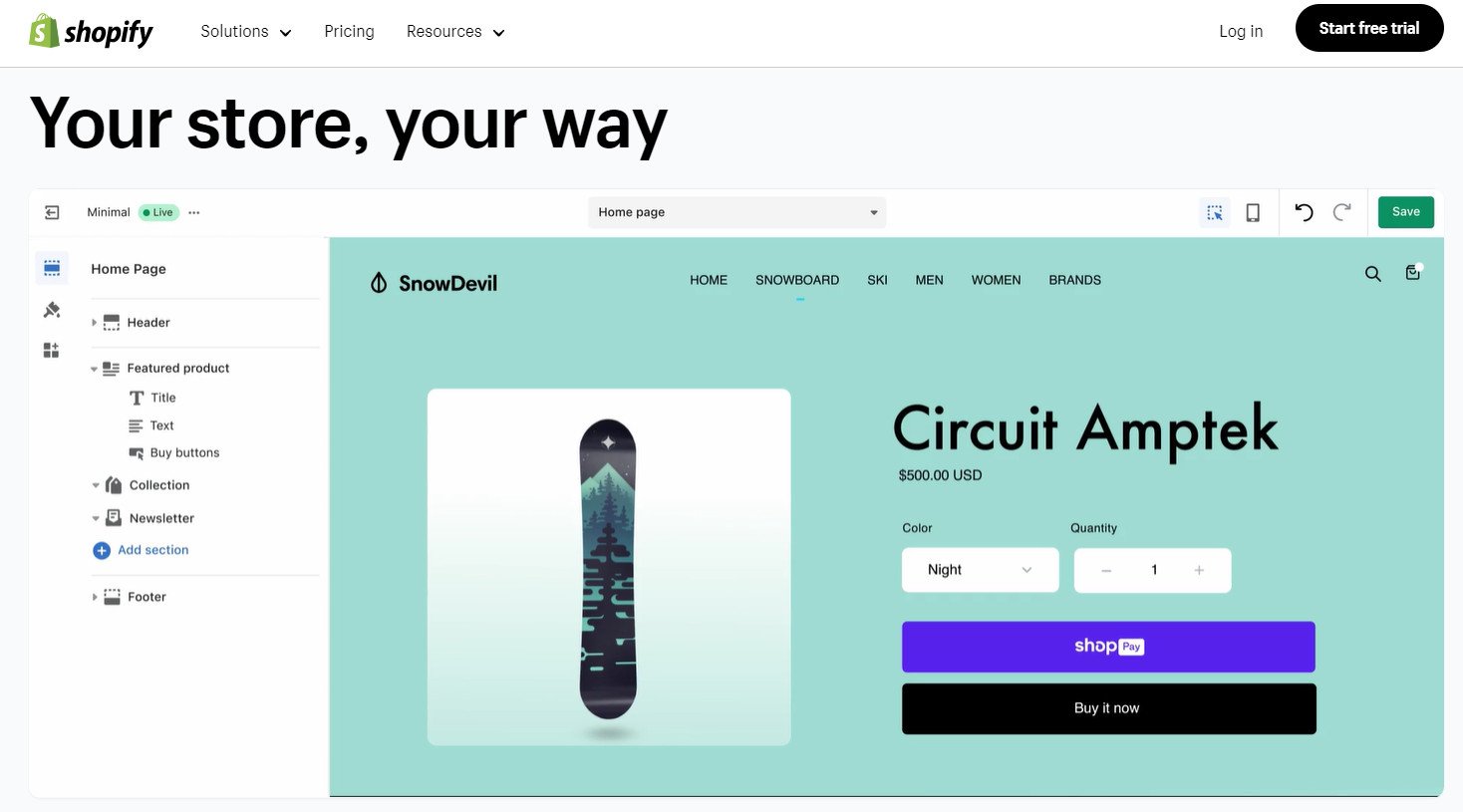
Shopify is one of the world’s largest platforms for running an e-commerce business and has been around since 2006. The company came to be because a snowboarding company couldn’t find an e-commerce platform that suited their requirements, so instead of giving up, they decided to create their own.
Since then, Shopify has expanded exponentially and now has a 19% global market share and boasts over $4.6 billion in revenue. In other words, Shopify is massive.
Shopify managed to establish itself as a main player because it actually listens to what its customers want. And that means creating plans to suit e-commerce business owners’ needs.
Shopify is a powerful eCommerce platform that empowers businesses to create a seamless online shopping experience. Whether you’re an established eCommerce business or just starting out, Shopify allows you to build your online store with ease. With features like customizable themes, a built-in payment gateway, and high-end security, Shopify provides everything you need to run a successful eCommerce business. If you already have an existing website, Shopify makes it easy to integrate your store with your current site.
Their eCommerce functionality is top-notch, allowing you to easily manage your inventory, track sales, and more. The robust eCommerce builder makes creating an online store a breeze, even for those with little to no experience. With Shopify, businesses across countless industries can leverage the power of an eCommerce platform that delivers real results.
The platform has a number of plans available, but the most popular is the Basic plan. Believe it or not, this isn’t Shopify’s cheapest or, indeed, most basic plan. That title goes to Shopify’s Starter plan.
However, if you want full use of the platform and all its features, the Basic plan is where you’ll get them for the most affordable price.
Start a free trial & get three months for $1/mo
From $29 per month
Basic Plan Pricing
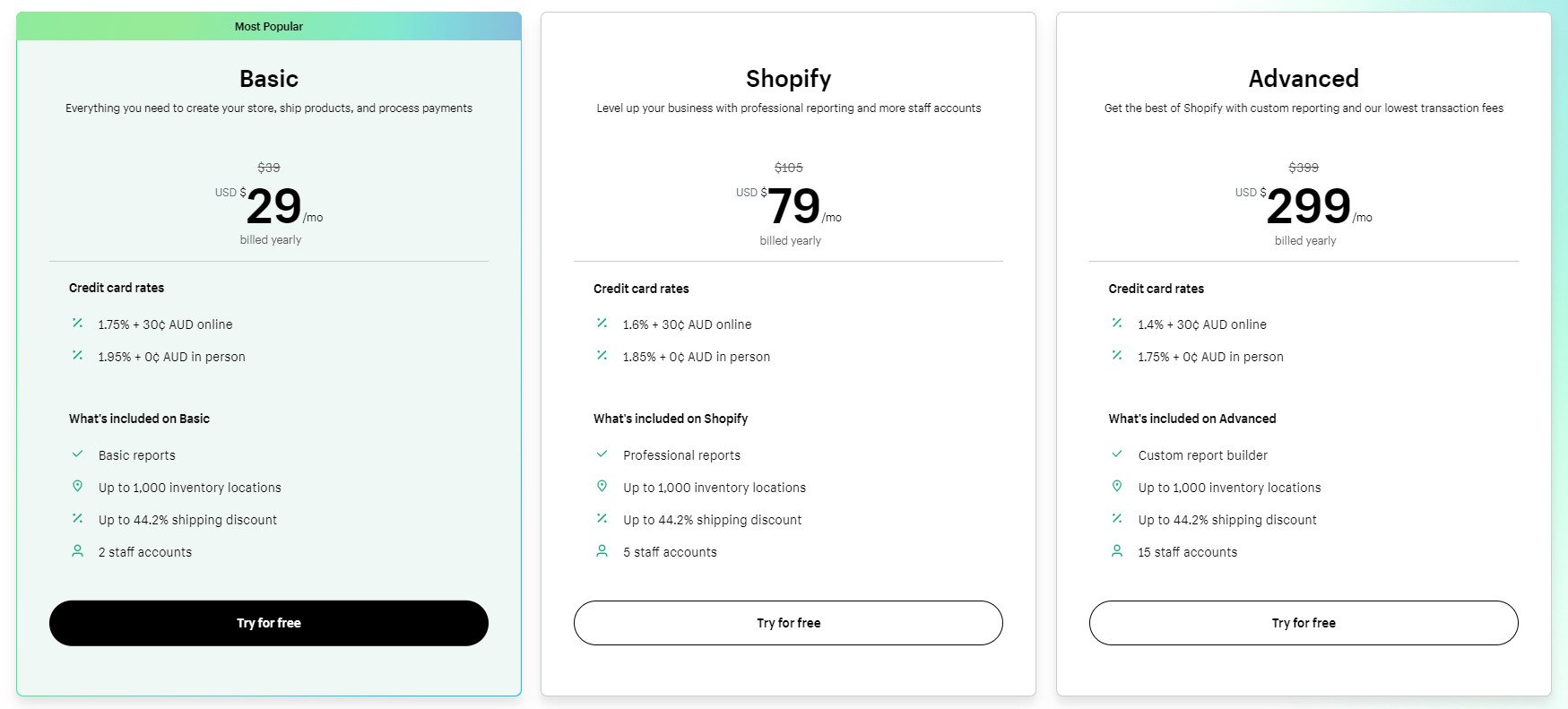
The Shopify Basic plan is available via a monthly or annual subscription fee:
- Monthly: $39 or;
- Annual: $29/month (billed annually)
Paying annually saves you 25% compared to paying monthly.
You can also try the platform for free for three days, and after this time period is up, you can pay a single $1 and use the platform for a further three months before paying a full subscription rate.
Since you can try the platform for over three months for next to nothing, you do not get a money-back guarantee.
Ready to give the Shopify Basic package a go? Sign up now for free.
Start a free trial & get three months for $1/mo
From $29 per month
Pros and Cons
Pros
- Full use of the platform and features for an affordable price
- Sell unlimited products and have up to 1,000 inventory locations
- Integrate with thousands of apps for a truly customized experience
- You get a stable, fast, and secure platform upon which to grow your business
Cons
- Transaction fees on sales are higher than other plans
- Integrating with third-party apps may incur additional costs
Features at a Glance
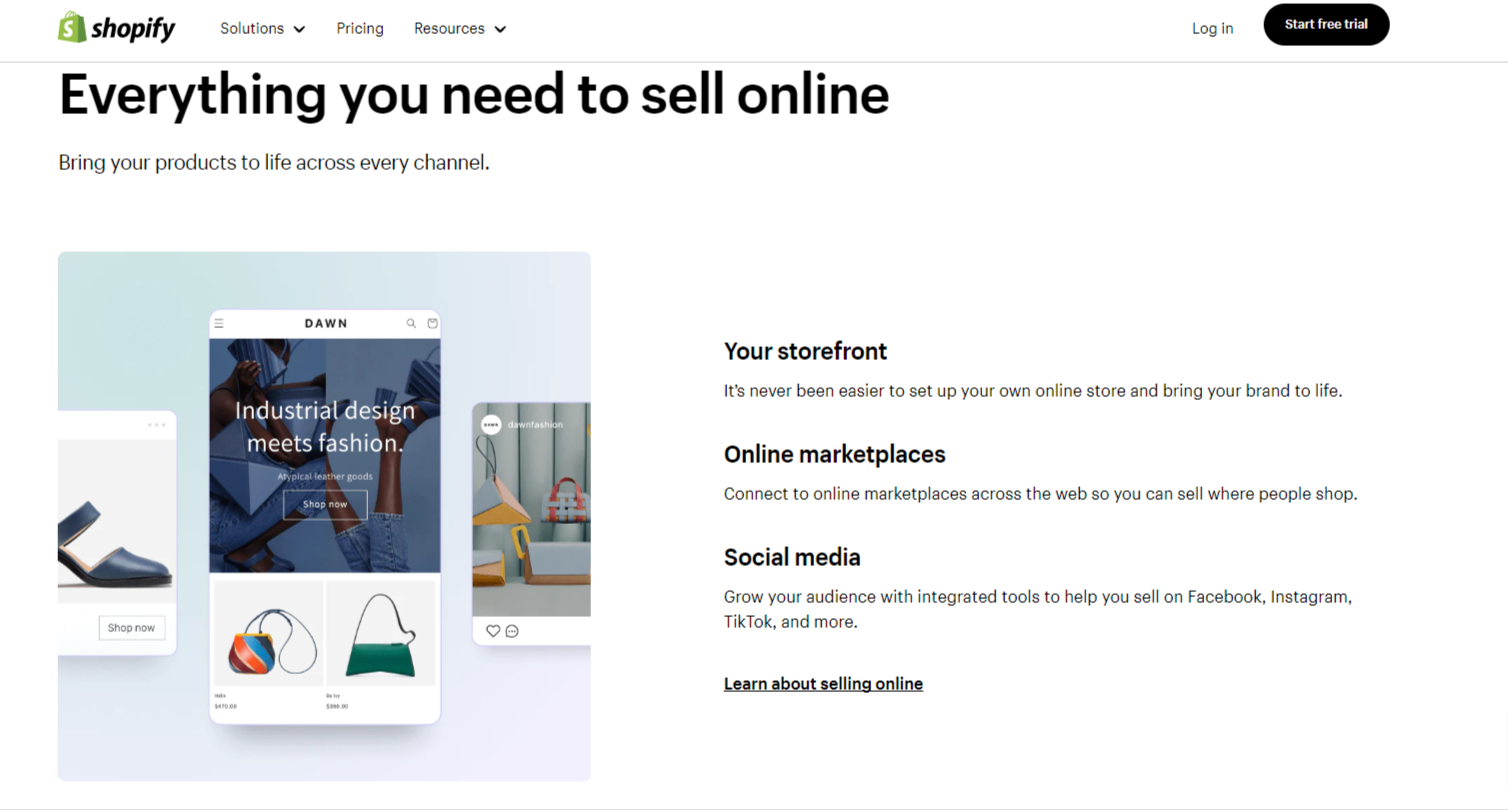
There’s a good reason why Shopify is the best. Just look at this raft of features you get for your Basic plan subscription fee:
- Free three-day trial and three months for $1
- Unlimited products
- Basic reporting and analytics
- Two staff accounts
- Up to 1,000 inventory locations
- All-in-one point-of-sale system
- Easy and intuitive dashboard
- World-class checkout and payment system
- Inventory and order management
- Automation tools
- Free (and paid) Shopify templates
- Drag-and-drop customization tool
- Seamless app integration
- Email inbox
- Customer chat box
- 24/7 customer support
Why Choose the Basic Plan?
Aside from Shopify being a world leader in e-commerce solutions (although that should be enough to convince you), here’s what I feel stands out about the platform.
Themes and Custom Site Builder
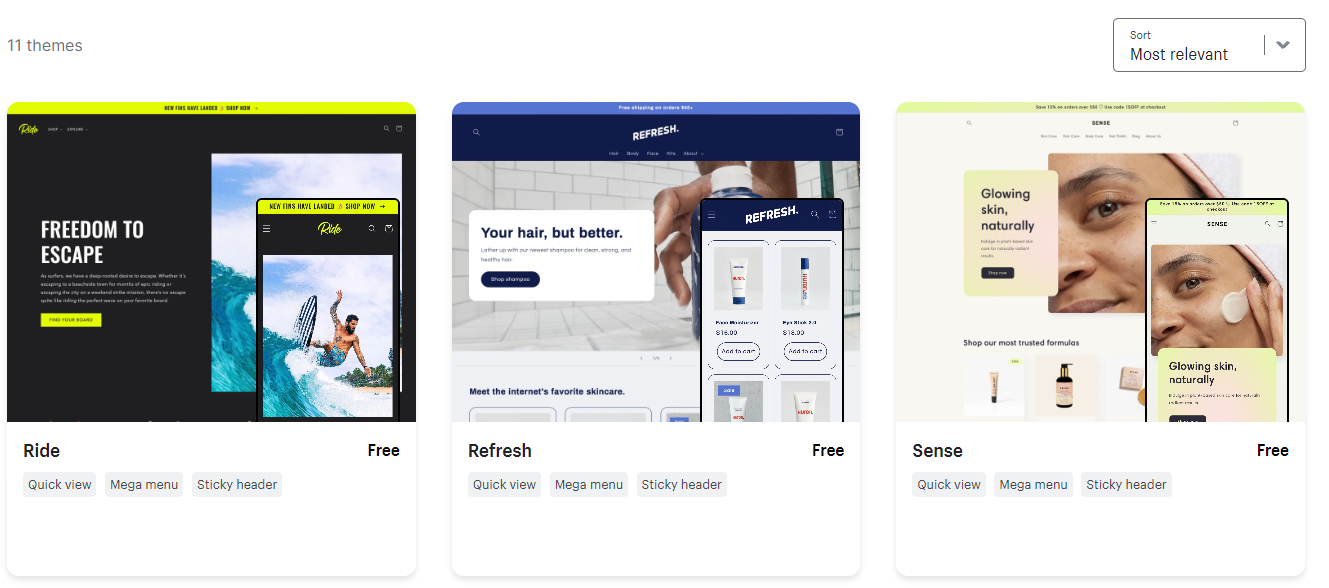
This is probably the most exciting aspect of creating your first Shopify store. You get to pick a theme and totally customize the look so your store is unique to your products and brand.
Shopify themes are essentially templates for your e-commerce website and give you a foundation upon which to build your store. Shopify provides 11 themes for free, or you can opt to splash out on one of the many paid themes.
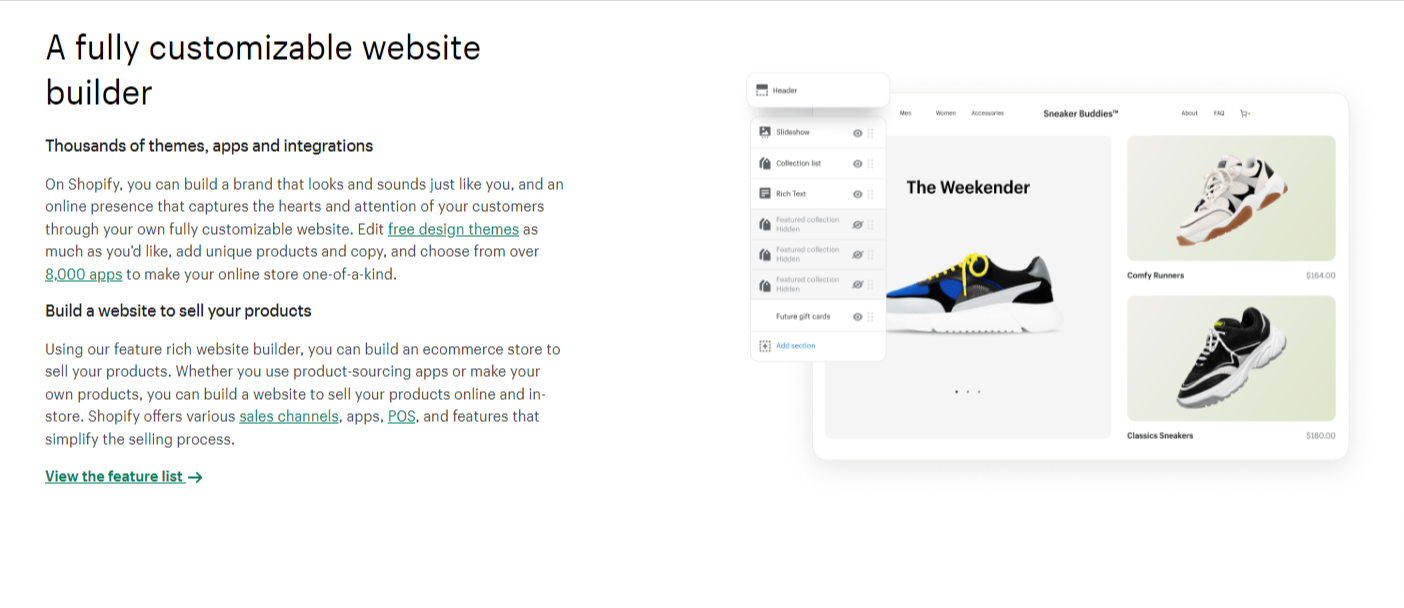
Once you have selected your theme, you can go ahead and make use of the sophisticated drag-and-drop editing tool, and I tell you, it really is a breeze to use.
I’ve created Shopify sites in the past and have always been blown away by the sheer number of customization options to hand. Those with zero coding knowledge can also breathe a sigh of relief because absolutely none is required here – it’s all done for you.
You don’t even have to come up with your own images. Shopify has a library with tonnes of beautiful images that you can use for your store, along with a wide choice of design elements, fonts, animations, and more.
Creatives will get lost in all the options and go to town. Non-creatives will be relieved it’s so easy to create a beautiful-looking store.
Unlimited Products Everywhere
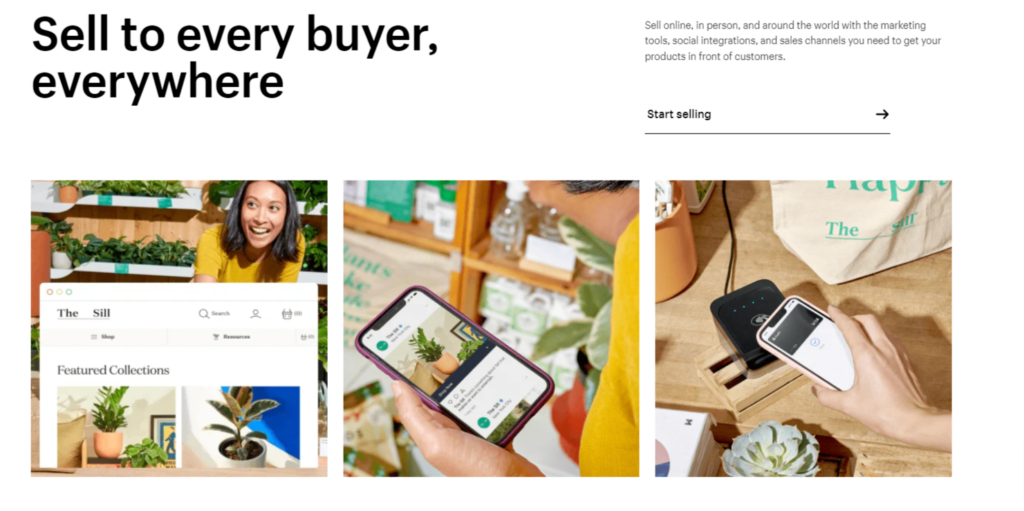
One thing that irks me is the limits that platforms place on what you can do. And typically, you need to pay more to get increases to those limits. It’s annoying.
Shopify frees you from this hassle because it allows you to set up unlimited product listings and sell to your heart’s content. Yes, that’s unlimited products even on the Basic plan, so you don’t have to worry about having to upgrade once you’re into the swing of things.
Furthermore, you can sell to anyone, anywhere in the world, whether in-person or online. Shopify lets you have up to a whopping 1,000 inventory locations. So if you want a warehouse in Warsaw, a depot in Durban, or a store in Seattle, you can have it all.
If you can’t deal with inventory but still want to sell, Shopify is fully optimized for dropshipping and print-on-demand.
Essentially, whatever you want to do, you can do it on a nearly unlimited basis.
Connect With Business Apps
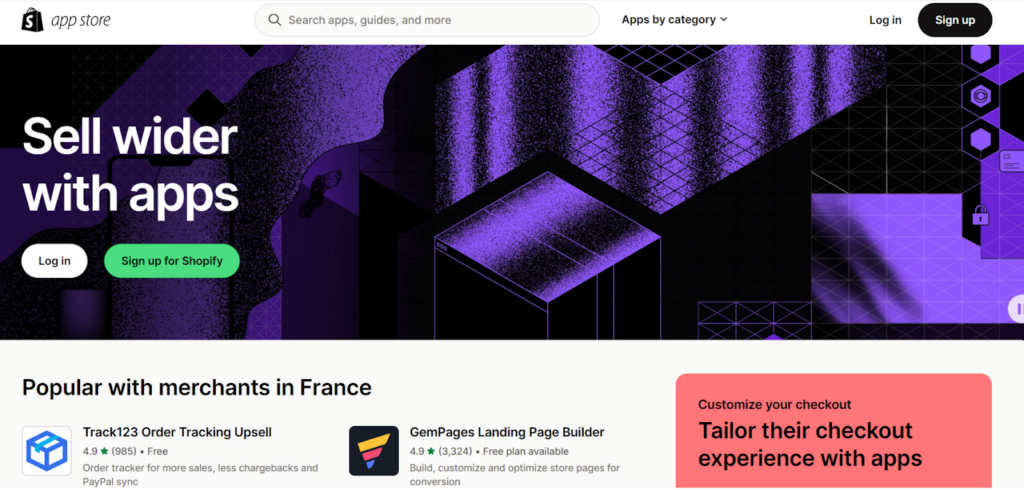
Now, when I said Shopify was big, I meant it. So much so that it has direct integrations for over 8,000 apps, including:
- Social media
- Drop shipping and print on demand
- Orders and shipping fulfillment
- Marketing, conversion, and SEO tools
- Store management, such as customer help, chat, loyalty programs, and more
- Extra design features
In fact, if you can’t find what you want on the Shopify platform, I can guarantee there will be an app for it in the Shopify app store.
This takes the customization aspect to the next level and provides you with every tool you could ever wish for to move your business forward in a seamless manner.
World Class Checkout System
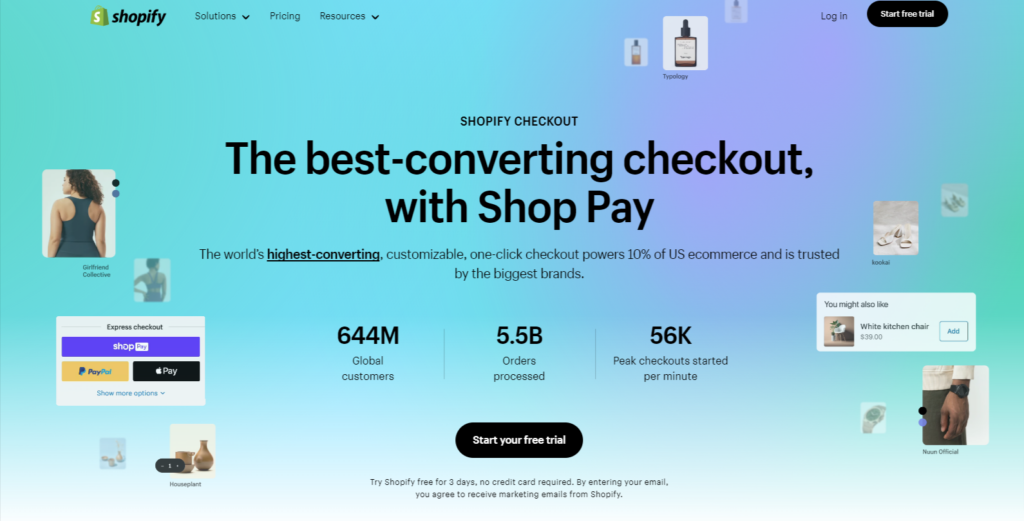
Shopify’s checkout is unbeatable. Saving you the hassle of connecting with third-party payment providers (although you can do this, too), the platform lets you take payments directly.
The Shop Pay tool is four times faster than standard checkout tools thanks to the “one-tap” nature of completing the transaction, which provides up to a 91% higher conversion rate for mobile and email-based shoppers.
Make use of Shopify’s sophisticated integration capabilities and include upsells, order bumps, coupons, donations, and more. Increase the quality of your customer contact lists by incorporating additional data collection and use the editing tool to customize the checkout to fit your brand.
Add flexible shipping options, pre-orders, subscriptions, express checkouts, and more into the mix, and you have one of the best and most comprehensive checkout systems in the world. It’s truly powerful stuff.
Automation Tools
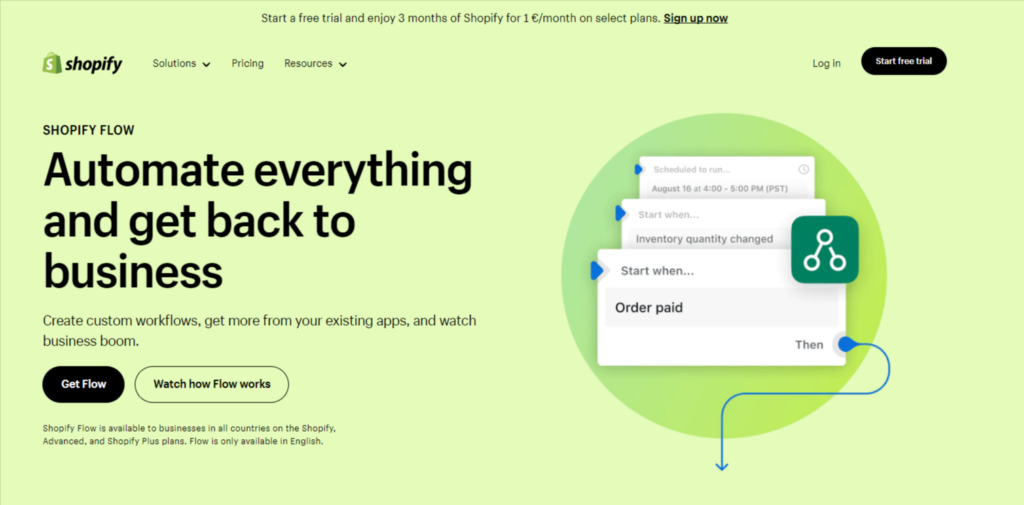
Automation is everywhere, no matter where you look. So it stands to reason that Shopify has embraced this technology.
It’s not as complicated as you think, either. Use no-code building blocks to create automated workflows for inventory management, loyalty and retention, fulfillment, fraud prevention, and more. You also get templates for commonly used automation flows, so all you need to do is plug it in and press “go.”
Automation takes a load of admin off your hands and gives you back time that you can spend on growing your business.
Here’s a little Shopify fact for you; during Black Friday, the platform performed 562 million automated workflows, and over one billion Shopify decisions are automated monthly.
Automation is useful and is a vital tool in helping you scale your business.
About Shopify
Shopify Pricing Plan
There is a range of Shopify plans to fit the needs of businesses of all sizes. Shopify basic plan is perfect for those just starting out, providing everything needed to launch an online store, including customizable templates and a built-in payment gateway.
Alternatively, their Shopify Advanced and Shopify Starter plans offer additional features like more advanced reporting and lower transaction fees. Shopify’s pricing plans are designed to meet the needs of businesses in any industry, with pricing that is competitive and affordable. The main
Shopify pricing plans include their Shopify basic, Shopify advanced, and Shopify starter plans, all of which offer unique feature sets to suit different business needs. While there are some additional Shopify costs to consider, such as transaction fees and Shopify fees, these are typically minimal and offset by the benefits provided by Shopify’s eCommerce platform.
Shopify General Features
One of the primary reasons for Shopify’s popularity is the platform’s impressive range of features. For retailers with brick-and-mortar locations, Shopify POS is an excellent option that allows you to manage both your online and in-person sales seamlessly. Additionally, their POS pricing is very competitive and comes with a vast range of hardware options to suit different budgets and needs.
Shopify’s advanced and Plus plans offer businesses of all dimensions a broad range of features, including enhanced reporting tools and sales channels, as well as access to various Shopify apps and extensions. Businesses that want to customize their site’s design can leverage Shopify’s theme store, which offers a diverse range of templates to choose from or can be customized to produce a unique feel.
In addition, Shopify provides features like discount codes and abandoned cart recovery that makes it easier to turn browsing potential customers into paying customers, resulting in a more profitable eCommerce business.
Shopify’s extensive list of features helps businesses achieve their goals, whether they want to optimize conversions, increase revenue, or both.
Shopify Payments and Transactions
Shopify’s payment and transaction features are one of the platform’s key strengths. Shopify Payments, Shopify’s built-in payment gateway, offers an easy way for businesses to accept credit card payments, without having to work with a third-party payment gateway provider.
Use Shopify Payments to avoid pesky transaction fees that other payment gateways can charge.
Shopify’s transaction fees, which are charged for each sale, are also reasonable compared to other eCommerce platforms, and its per-transaction pricing ensures that businesses pay depending on the number of transactions they make.
Though there are credit card processing fees involved, Shopify’s transparent pricing structure ensures that businesses know exactly what they are paying, with no hidden fees or surprise costs.
Questions & Answers
Our Verdict ⭐
The Shopify Basic plan is truly a one-stop shop for anyone thinking of starting an e-commerce business. Its tools and features are unrivaled, and the ease of use makes it beginner-friendly while still providing more than enough for seasoned experts. The plan is also very affordable; it costs $29/month (paid yearly).
Start selling your products online today with the world’s leading all-in-one SaaS e-commerce platform that lets you start, grow, and manage your online store.
Start a free trial & get three months for $1/mo
However, if you’re on a limited budget and nervous about starting out in e-commerce, you may find the Starter plan more suitable. You get limited features, but it only costs $5/month, making it an excellent, low-risk option.
That said, if you want a platform with all the e-commerce bells and whistles you can shake a stick at, you absolutely cannot go wrong with the Shopify Basic plan.
Have I done enough to convince you to take the plunge? Sign up now.
Start a free trial & get three months for $1/mo
From $29 per month
How We Review Website Builders: Our Methodology
When we review website builders we look at several key aspects. We assess the intuitiveness of the tool, its feature set, the speed of website creation, and other factors. The primary consideration is the ease of use for individuals new to website setup. In our testing, our evaluation is based on these criteria:
- Customization: Does the builder allow you to modify template designs or incorporate your own coding?
- User-Friendliness: Are the navigation and tools, such as the drag-and-drop editor, easy to use?
- Value for Money: Is there an option for a free plan or trial? Do paid plans offer features that justify the cost?
- Security: How does the builder protect your website and data about you and your customers?
- Templates: Are the templates of high quality, contemporary, and varied?
- Support: Is assistance readily available, either through human interaction, AI chatbots, or informational resources?
Learn more about our review methodology here.

